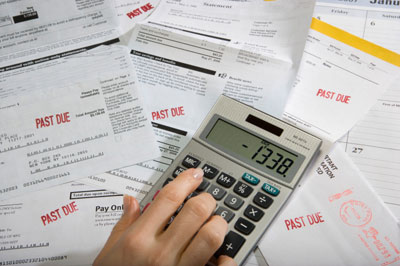How to Avoid Debt
First off, don’t become discouraged by debt. Nearly everyone has some debt, especially those who frequently use credit cards or attended college. It’s all a matter of handling it step by step without feeling overwhelmed and also avoiding acquiring further debt.
How to fix it
There is no quick fix to debt, so don’t let shady internet schemes or ads on TV tell you otherwise. Though your debt cannot be magically erased, there is a lot you can do to get out of debt if you’re determined.
The first step is to acquire a realistic understanding of your debt. Instead of avoiding looking at the overall amount on a bill and quickly scribbling out a check for the minimum payment, gather all your bills together, sit down, and figure out just how much you owe. Take notes and keep an organized list of the debt you currently have. Look at the minimum payment and interest rates and get a basic understanding of how it all works.
Once you understand your debt and where you stand, there are various methods that exist, which can help you manage debt. You may want to pay off the largest balance first, which will make it easier to tackle the smaller ones later on. An alternative method would be to work smallest to largest, because paying off the smaller debts first gives you a sense of accomplishment that encourages you to continue with the current plan.
Find out what plans work for you and maybe even consult an expert for advice on payment plans. Look into credit counseling to help you manage your debt. For now, avoid using a credit card unless you absolutely have to so you don’t pile up even more debt!
How to prevent it
It’s all too easy to get caught up in the emotional rush of making a new purchase, or of buying something for your kids or partner that you wouldn’t buy for yourself. People spend money in an effort to feel happy, though we’ve all heard the age-old saying “money can’t buy happiness”. No, but it can give you a nice rush of endorphins. Don’t get caught up in the instant gratification of a purchase. Instead, remind yourself of the goal of saving or of paying off debt. This mindset is not natural to most people, so you’ll need to remind yourself constantly and learn to have a lot of self control. It’s easy for people to be more concerned with the now instead of the future. Be kind to your future self and avoid large credit card bills.
Try not to use your credit card for small purchases. While it might be tempting, when you don’t have cash on you or are waiting for your next paycheck to replenish your bank account, spending $20 to eat out really adds up over time. Use your credit card for large purchases, like appliances or cars, and avoid small luxury items until you have the disposable income or make a plan to save up to purchase the item. You could even make two separate bank accounts, one just for money you can spend on more frivolous items and the other to pay bills and purchase necessities. Keep the two cards separate and don’t allow yourself to budge when using them.
It’s important to make budgets that accurately reflect your current income. By being aware of your means and having a spending plan, it can help you avoid spending above them.
Read this guide for more information about debt in the United States.
